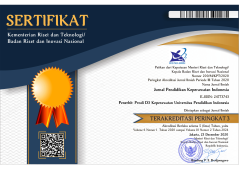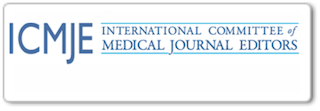The Intervention Strategies To Reduce Tuberculosis Stigma Based On Community: A Systematic Review
Abstract
ABSTRACT
Stigma in tuberculosis patients causes discrimination and social isolation that have an impact on efforts to manage tuberculosis treatment. The purpose of this review is to explore based community intervention strategies to reduce tuberculosis (TB) stigma. Method: The design applied systematic review. Data was retrieved from online database Wiley Online Library, Science Direct, PubMed, Research Gate, Springer Link, Scopus, Google Scholar, and national journal in the period of 2008-2018. The study selection was conducted in the search string by applying the keywords “TB” AND “Stigma”, “Reduce stigma”, “Intervention TB Stigma”, “tackling stigma TB”, “strategy for TB stigma”, exploration and selection of title, abstract were conducted inclusion criteria, and search the articles by screening reference lists in citations in the literature to be additional articles. Analysis result of study uses PRISMA flow diagram. Results: The intervention strategies to reduce TB stigma reviewed from articles and found 4 intervention strategies are: (1) Health education, such as knowledge shipping about TB and TB Campaigns, (2) Home Visit, (3) TB Patients support such as Community, family support, social support TB Club, and financial support, (4) Enhancing Qualities of health worker. Conclusions: The intervention strategies to reduce TB stigma are needed in reducing TB stigma. Low TB stigma has positive effect in controlling and eliminating TB. The most common intervention are TB patient support and health education.
ABSTRAK
Stigma pada pasien tuberkulosis (TB) menyebabkan diskriminasi dan isolasi sosial yang berdampak pada upaya manajemen pengobatan TB. Tujuan dari literatur review ini untuk mengeksplorasi strategi intervensi di komunitas untuk mengurangi stigma tuberkulosis (TB). Desain menerapkan tinjauan sistematis. Data diambil dari database online Wiley Online Library, Science Direct, PubMed, Research Gate, Springer Link, Scopus, Google Cendekia, dan jurnal nasional pada periode 2008-2018. Pencarian artikel dalam sistematik review ini menerapkan kata kunci "Tuberkulosis" DAN "Stigma", "Mengurangi stigma", "Intervensi TB Stigma", "menangani stigma TB", "strategi untuk stigma TB". Eksplorasi dan pemilihan judul dan abstrak berdasarkan kriteria inklusi, dan mencari artikel dengan menyaring daftar referensi dalam kutipan dalam literatur untuk menjadi artikel tambahan. Hasil analisis penelitian menggunakan diagram alir PRISMA. Strategi intervensi untuk mengurangi stigma ditemukan empat strategi intervensi yaitu: (1) Pendidikan kesehatan, seperti meningkatkan pengetahuan tentang TB dan Kampanye TB, (2) Kunjungan Rumah, (3) Dukungan pasien TB seperti Komunitas, dukungan keluarga, dukungan sosial TB Club, dan dukungan keuangan, (4) Meningkatkan Kualitas pekerja kesehatan. Kesimpulan: Strategi intervensi untuk mengurangi stigma TB diperlukan dalam mengurangi stigma TB. Stigma TB yang rendah memiliki efek positif dalam mengendalikan dan eliminasi TB. Intervensi yang paling umum adalah dukungan pasien TB dan pendidikan kesehatan.
Keywords
Full Text:
PDFReferences
Bappenas. (2015). Laporan Pencapaian Tujuan Pembangunan Milenium di Indonesia 2014.
Baral, S. C., Karki, D. K., & Newell, J. N. (2007). Causes of stigma and discrimination associated with tuberculosis in Nepal : a qualitative study, 10, 1–10. https://doi.org/10.1186/1471-2458-7-211
Chakrabartty, A., Basu, P., Ali, K. M., Sarkar, A. K., & Ghosh, D. (2018). Tuberculosis related stigma and its effect on the delay for sputum examination under the Revised National Tuberculosis Control Program in India. Indian Journal of Tuberculosis, 65(2), 145–151. https://doi.org/10.1016/j.ijtb.2017.08.032
Cheng, J., Huang, X., Lin, M., Wang, Y., & Yeh, T. (2018). A mental health home visit service partnership intervention on improving patients ’ satisfaction. Archives of Psychiatric Nursing, 32(4), 610–616. https://doi.org/10.1016/j.apnu.2018.03.010
Chinouya, M. J., & Adeyanju, O. (2017). A disease called stigma : the experience of stigma among African men with TB diagnosis in London. Public Health, 145, 45–50. https://doi.org/10.1016/j.puhe.2016.12.017
Cohen, M. J., Ewing, H., Eakin, M., Sterling, T., & Zechmeister, E. J. (2018). Blaming the Victim : Knowledge of Tuberculosis is Associated with Greater Stigma in Brazil.
Collins, R. L., Wong, E. C., Cerully, J. L., Schultz, D., & Eberhart, N. K. (2013). Interventions to Reduce Mental Health Stigma and Discrimination _ RAND.
Courtwright, A. (2010). Tuberculosis and Stigmatization : Pathways and Interventions. Public Health Report, 125, 34–42.
Craig, G. M., Daftary, A., Engel, N., Driscoll, S. O., & Ioannaki, A. (2017). International Journal of Infectious Diseases Tuberculosis stigma as a social determinant of health : a systematic mapping review of research in low incidence countries. International Journal of Infectious Diseases, 56, 90–100. https://doi.org/10.1016/j.ijid.2016.10.011
Cremers, A. L., Laat, M. M. De, Kapata, N., Gerrets, R., Klipstein-grobusch, K., & Grobusch, M. P. (2015). Assessing the Consequences of Stigma for Tuberculosis Patients in Urban Zambia, 113, 1–16. https://doi.org/10.1371/journal.pone.0119861
Effendi, W. I. (2018). Tuberkulosis dan Stigma.
Frost, D. M. (2011). (Frost, 2011) Social stigma and its consequences for the socially stimatized.pdf, 11, 824–839. https://doi.org/10.1111/j.1751-9004.2011.00394.x Social
Goffman, E. (1963). Goffman, Erving(1963) Stigma. London: Penguin. Stigma: Notes on the Management of Spoiled Identity. London: Penguin Group.
Gronholm, P. C., Henderson, C., Deb, T., & Thornicroft, G. (2017). Interventions to reduce discrimination and stigma : the state of the art. Social Psychiatry and Psychiatric Epidemiology, 52(3), 249–258. https://doi.org/10.1007/s00127-017-1341-9
Health Evidence. (2016). Quality Assessment Tool – Review Articles.
Hidayati, E. (2015). Pengetahuan dan stigma masyarakat terhadap TBC setelah diberikan pendidikan kesehatan mengenai penegahan dan penularan. Prevention, 2(1), 17–23.
Hopwood, M. (2016). Interventions to reduce stigma : A narrative review of the literature. Art & Social Science Centre Fos Social Research in Health, (August).
International HIV/AIDS Alliance. 2011. Integrating stigma reduction into HIV programming: Lessons from the Africa Regional Stigma Training Programme. Alliance.
Kementrian Kesehatan RI. (2015). InfoDatin. InfoDatin. https://doi.org/24442-7659
KNCV. (2016). Annual report 2016 (Vol. 31).
Kurspahić-mujčić, A., Hasanović, A., & Sivić, S. (2013). Tuberculosis related stigma and delay in seeking care after the onset of symptoms associated with tuberculosis, 10(April), 272–277.
Macq, J., Solis, A., Martinez, G., & Martiny, P. (2008). Tackling tuberculosis patients ’ internalized social stigma through patient centred care : An intervention study in rural Nicaragua, 10, 1–10. https://doi.org/10.1186/1471-2458-8-154
Misir, P. (2013). HIV / AIDS stigma-reduction on VCT uptake : An adapted systematic review, 18, 150–164.
Morgan, K., Villiers-tuthill, A., Barker, M., & Mcgee, H. (2014). The contribution of illness perception to psychological distress in heart failure patients, 1–9.
Moriarty, A., Jolley, S., Callanan, M. M., & Garety, P. (2012). Understanding reduced activity in psychosis : the roles of stigma and illness appraisals, 1685–1693. https://doi.org/10.1007/s00127-012-0475-z
National Academies of Sciences, Engineering, and M. (2016). Ending discrimination against people with mental and substance use disorders: The evidance for stigma change. United State of America. https://doi.org/10.17226/23442
Nyblade, L., Stangl, A., Weiss, E., & Ashburn, K. (2009). Combating HIV stigma in health care settings : what works ? Journal of the International AIDS Society, 7. https://doi.org/10.1186/1758-2652-12-15
Rau, A., Wouters, E., Engelbrecht, M., Masquillier, C., Uebel, K., & Kigozi, G. (2018). Towards a health-enabling working environment - developing and testing interventions to decrease HIV and TB stigma among healthcare workers in the Free State , South Africa : study protocol for a randomised controlled trial, 1–15.
Royce, R. A., Colson, P. W., Woodsong, C., Swinson-evans, T., Walton, W., Maiuri, A., … Royce, R. A. (2017). Tuberculosis Knowledge , Awareness , and Stigma Among African-Americans in Three Southeastern Counties in the USA : a Qualitative Study of Community Perspectives. Journal of Racial and Ethnic Health Disparities, 47–58. https://doi.org/10.1007/s40615-015-0200-1
Sermrittirong, S. (n.d.). Stigma and stigma interventions related to leprosy and tuberculosis in Thailand.
Sharma, D., Joshi, A., & Kumar, P. (2017). Stigma and Psychological Problems Encountered By People with Leprosy and How Counselling Helps : A Systematic Review, 4(4). https://doi.org/10.25215/0404.039
Sommerland, N., Wouters, E., Masquillier, C., Engelbrecht, M., Kigozi, G., Uebel, K., … Rau, A. (2017). Stigma as a barrier to the use of occupational health units for tuberculosis services in South Africa. The International Journal of Tuberculosis and Lung Disease, 21(11), 75–80. https://doi.org/10.5588/ijtld.17.0030
Sommerland, N., Wouters, E., Mitchell, E. M. H., Ngicho, M., Redwood, L., Masquillier, C., … Van Rie, A. (2017). Evidence-based interventions to reduce tuberculosis stigma: a systematic review. The International Journal of Tuberculosis and Lung Disease, 21(11), 81–86. https://doi.org/10.5588/ijtld.16.0788
Studies, A. T. (2008). Downs and black checklist.
Swedish Agency for Health Technology Assessment and Assessment of Social Services. (2016). Evaluation and synthesis of studies using qualitative methods of analysis swedish agency for health technology assessment and assessment of social services.
Tadesse, S. (2016). Stigma against tuberculosis patients in Addis Ababa, Ethiopia. PLoS ONE, 11(4), 1–11. https://doi.org/10.1371/journal.pone.0152900
Tuberculosis. (n.d.).
Wynne, A. (2012). TB, HIV, and TB/HIV co-infection: Community Knowledge and Stigma in Western Uganda.
Yin, X., Yan, S., Tong, Y., Peng, X., Yang, T., Lu, Z., & Gong, Y. (2017). Status of tuberculosis-related stigma and associated factros: a cross-sectional study in central China.
DOI: https://doi.org/10.17509/jpki.v5i1.16371
Refbacks
- There are currently no refbacks.
Jurnal Pendidikan Keperawatan Indonesia(JPKI) published by Indonesia University of Education. JPKI is licensed under a Creative Commons Attribution-ShareAlike 4.0 International License.
Office :
Nursing Department. FPOK UPI.
229, Dr. Setiabudhi Street. Bandung 40154
West Java , Indonesia
E-mail : jpki@upi.edu

_.png)
_.png)
_.png)











